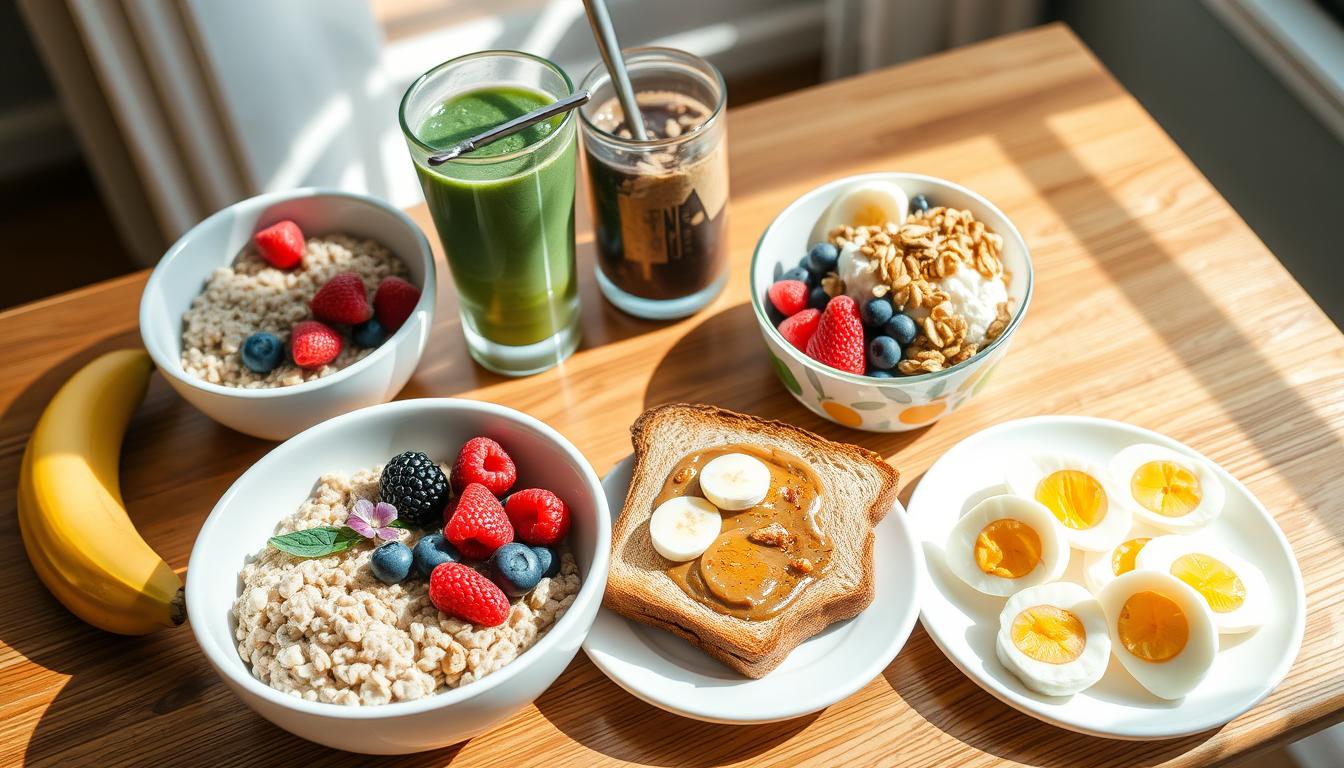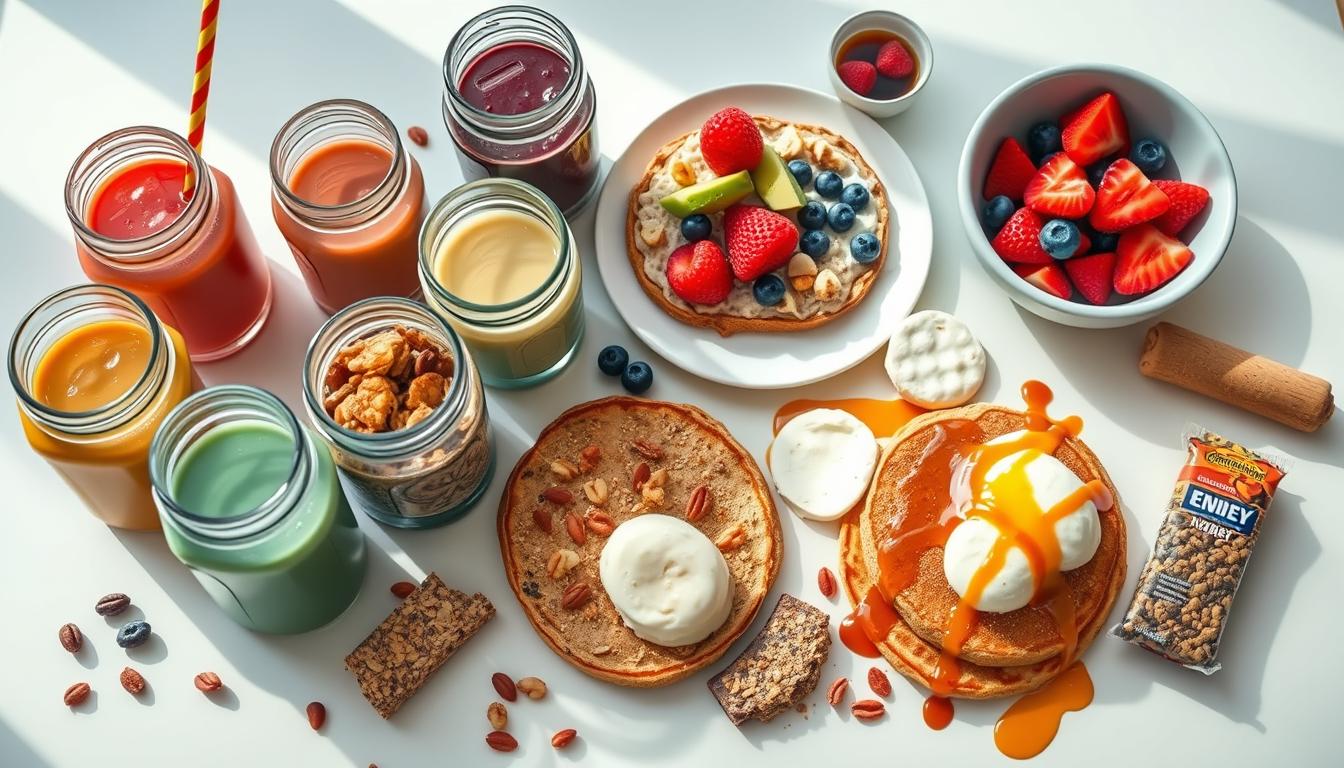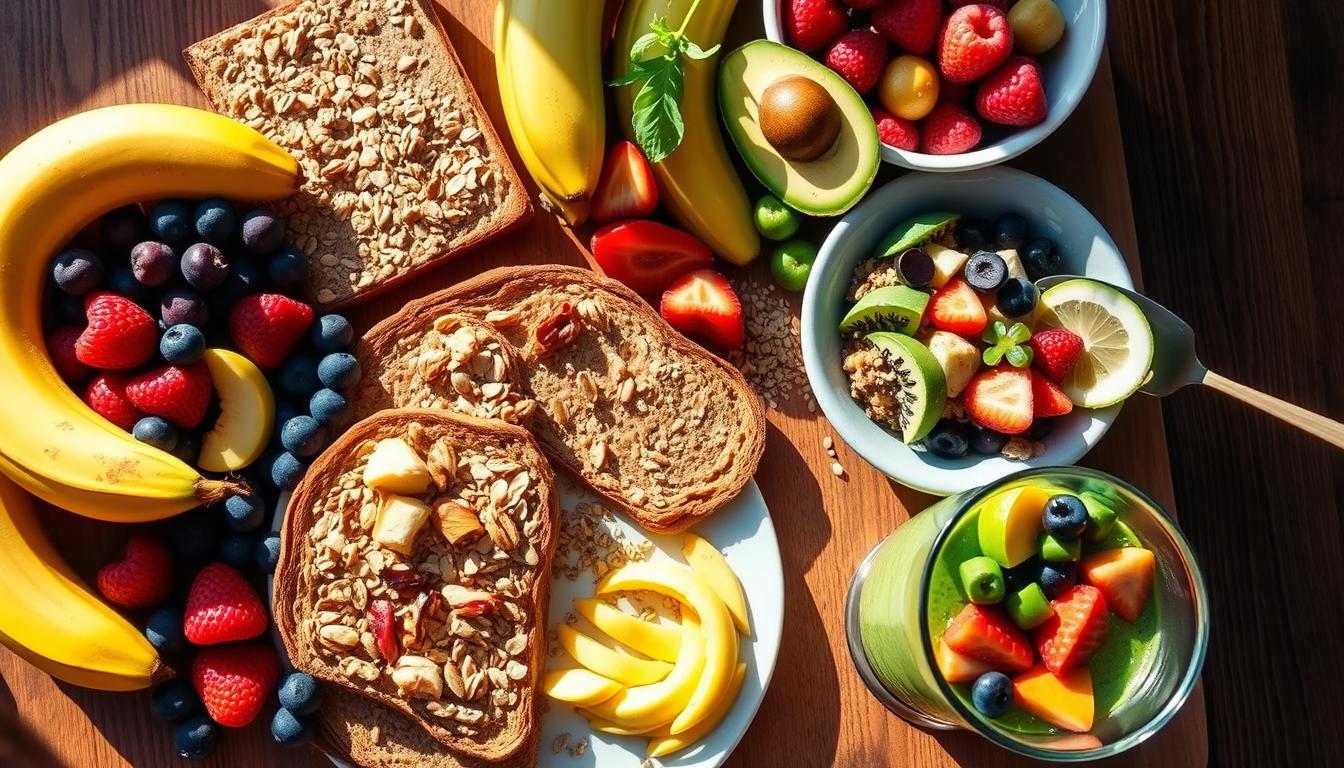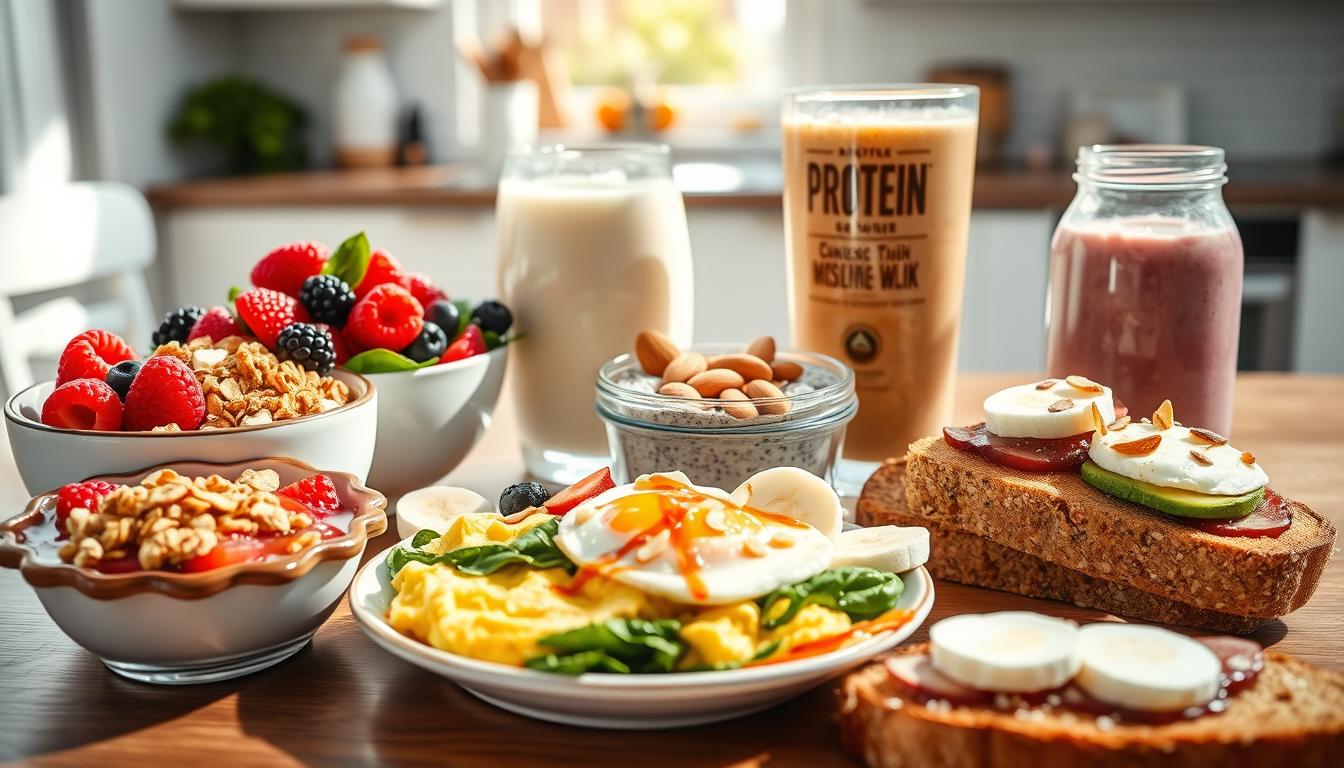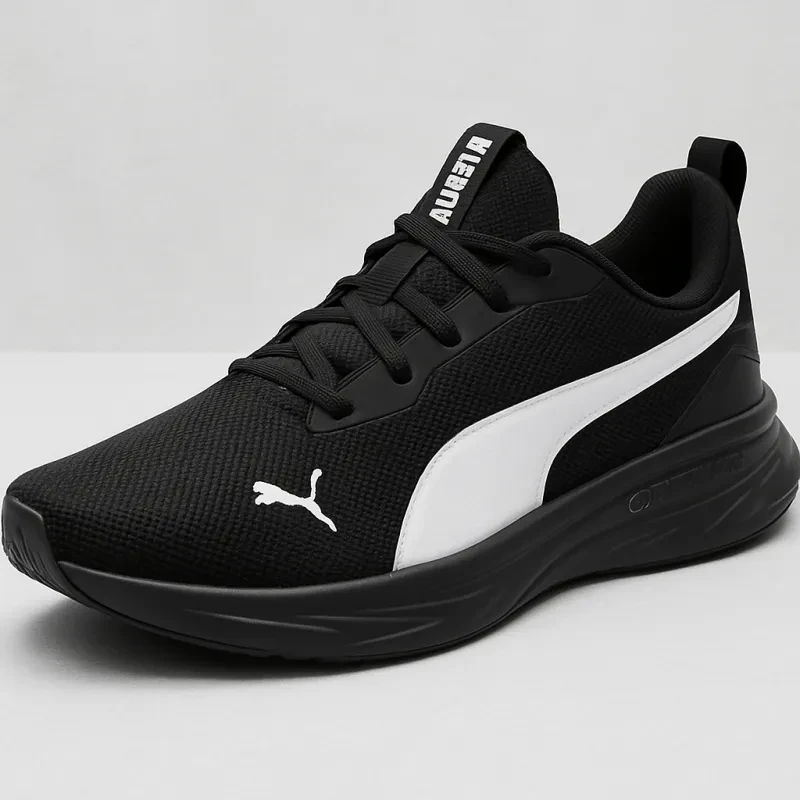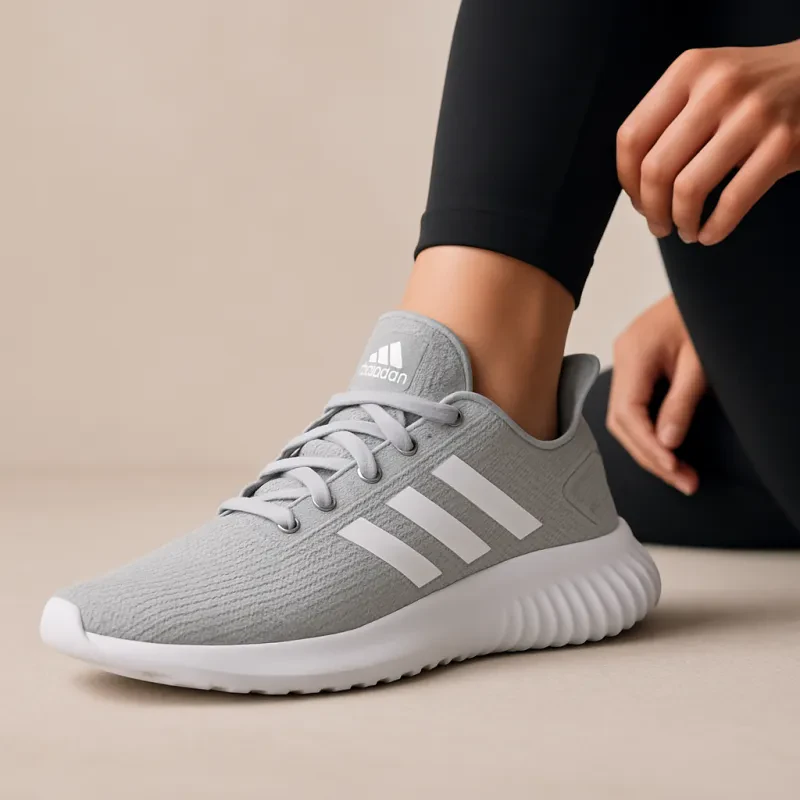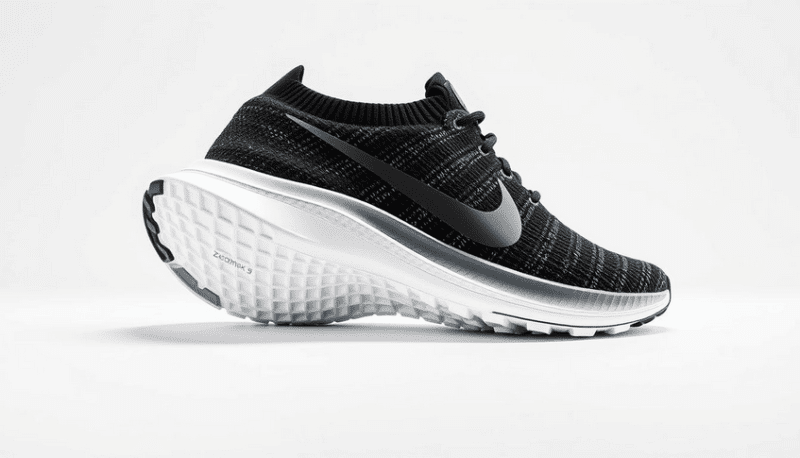Breakfast is key for runners, giving them the energy and nutrients they need for early morning workouts. Studies show that eating before running can help you go longer without getting tired. It also makes your workout feel easier and boosts your performance.
It's best to eat a meal high in carbs about one to four hours before running. Choose foods that are easy to digest. This way, you won't feel weighed down during your run.
Runners should avoid foods high in fat, fiber, and protein before running. These can upset your stomach during exercise. By choosing the right foods, you can fuel up for your morning runs and reach your goals.
Key Takeaways
- Breakfast is essential for runners, providing energy and increasing glycogen stores.
- Eating before a run can delay fatigue and decrease perceived exertion.
- Runners should consume a high-carbohydrate snack or meal 1-4 hours before running.
- Easily digestible carbohydrates are ideal, with minimal fat, fiber, and protein to prevent gastrointestinal issues.
- Experiment with different pre-run foods to find what works best for individual preferences and tolerances.
Understanding Pre-Run Nutrition Fundamentals
For runners, eating right before a workout is key. It fuels your body for the best performance. Carbs are the main energy source, stored as glycogen. Eating the right carbs before a run gives you energy to keep going.
Timing Your Pre-Run Breakfast
When you eat before running matters a lot. For runs up to 60 minutes, eat a small snack of 100-200 calories 30-60 minutes before. For longer runs, eat a bigger meal of 300-500 calories 1-4 hours before. This lets your body digest without discomfort during the run.
Optimal Nutrient Balance for Runners
Your pre-run meal should have the right mix of nutrients. Carbs should be 40-60% of your meal, focusing on easy-to-digest foods like white bread and fruit. Add some protein and healthy fats for lasting energy and fullness. Stay away from high-fiber foods to avoid stomach issues during your run.
https://youtube.com/watch?v=uHMmjj7U77E
"For a 70-kilogram athlete, the recommendation would be 280 grams of carbohydrates four hours before racing."
Knowing how to fuel your body in the morning is crucial. It prepares you for your early morning runs with energy and confidence.
Quick and Energizing Breakfasts for Early Morning Runs
Fueling up right before your run is key for a great workout. As a runner, you need food that gives you energy, helps your muscles recover, and doesn't upset your stomach. There are many tasty and healthy breakfast ideas to pick from.
A banana with nut butter is a top choice. Bananas give you carbs, and nut butter adds protein and healthy fats. Another good option is oatmeal with berries and cinnamon. Oats give you lasting energy, and berries help with recovery.
For a protein-rich breakfast, try Greek yogurt with granola and almonds. Yogurt helps repair muscles, and the granola and nuts add carbs, fats, and more protein. If you're in a rush, energy bars, fruit and nut bars, or a protein smoothie are great quick options.
| Breakfast Option | Nutrients Provided | Ideal Timing |
|---|---|---|
| Banana with nut butter | Carbohydrates, protein, healthy fats | 1-2 hours before run |
| Oatmeal with berries and cinnamon | Complex carbs, fiber, antioxidants | 1-2 hours before run |
| Greek yogurt with granola and almonds | Protein, carbohydrates, healthy fats | 1-2 hours before run |
| Energy bar or fruit and nut bar | Carbohydrates, protein, healthy fats | 30-60 minutes before run |
| Protein-rich smoothie | Carbohydrates, protein, nutrients | 30-60 minutes before run |
Try different breakfasts to find what works best for you. With a bit of planning, you can start your runs with energy and confidence.
Essential Carbohydrates for Runner's Energy
Carbohydrates are key for runners, especially in the morning. They should make up 60% to 65% of a runner's diet. Some sprinters might need up to 70% carbs.
Simple vs Complex Carbs for Morning Runs
Simple carbs like white bread and fruit give quick energy. But complex carbs, such as oats and brown rice, release energy slowly. Mixing both can help you run longer without getting tired.
Best Grain-Based Options
- Bagels
- Whole grain toast
- Oatmeal
- Rice cakes
Fruit-Based Energy Sources
- Bananas
- Dried fruit
- 100% fruit juice
These foods and drinks are full of carbs. They give your muscles the energy they need for morning runs. Adding a bit of protein and healthy fats makes your pre-run meal more balanced.
"Carbohydrates are the primary fuel source for runners, and getting the right balance of simple and complex carbs can make a big difference in your morning workout performance."
Protein-Packed Morning Fuel Solutions
Protein-rich breakfasts are key for early morning runs. They give you energy and help your muscles recover. You can choose from yogurt, cottage cheese, or smoothies to start your day right.
A Greek yogurt parfait has about 25g of protein. A smoked salmon sandwich has around 24g. For plant-based options, try a breakfast hash with about 20g of protein.
Smoothies are great for protein too. A berry cheesecake smoothie can have up to 25g of protein. If you have a sensitive stomach, try chocolate milk or protein shakes for an easy breakfast.
Looking for something to eat on the go or want to carb-load? These protein-packed breakfasts will help you power through your workout.
| Breakfast Option | Protein Content (g) |
|---|---|
| Greek Yogurt Parfait | 25 |
| Smoked Salmon Sandwich | 24 |
| Plant-Based Breakfast Hash | 20 |
| Berry Cheesecake Smoothie | 25 |
| Turkey Sausage Breakfast Burrito | 24 |
| Protein Bar with Dried Edamame and Banana | 25 |
Adding these protein-rich breakfasts to your routine helps fuel your body for runs. Choose from sandwiches, smoothies, or bars for a balanced start to your day.
"Proper pre-workout nutrition can make all the difference in your running performance. Aim for a balance of carbohydrates, protein, and healthy fats to sustain energy levels and support muscle recovery."
No-Cook Breakfast Options for Busy Runners
As a runner, it's key to fuel up right before your morning run. But, getting a good breakfast ready can be tough with a busy schedule. Luckily, no-cook breakfasts are quick and easy, giving you the energy you need.
Make-Ahead Breakfast Ideas
Runners can prep healthy breakfasts ahead of time to save morning rush. Here are some great make-ahead ideas:
- Overnight Oats - Mix oats, milk, and toppings like berries or nut butter. Refrigerate overnight for a quick breakfast.
- Chia Pudding - Blend chia seeds with milk, add honey, and top with fruit for a protein-rich treat.
- Mini Egg Frittatas - Bake egg muffins with veggies and cheese. They're a protein-packed breakfast you can take on the go.
Grab-and-Go Solutions
For those mornings when time is tight, pre-packaged foods are a lifesaver. Keep energy bars, fresh fruit, and trail mixes handy for a quick energy boost.
Quick Assembly Options
Even with no time to cook, you can still make a healthy breakfast fast. Try yogurt parfaits, nut butter on rice cakes, or whole grain cereal with milk.
With these no-cook breakfasts, busy runners can fuel up for their runs without losing out on nutrition or convenience.
Liquid Breakfast Solutions for Sensitive Stomachs
For athletes with sensitive stomachs, liquid breakfasts are a lifesaver. They offer carbs and proteins without upsetting your stomach. This makes them perfect for fueling up without discomfort.
Fruit smoothies are a favorite. You can mix bananas, berries, spinach, yogurt, and protein powder. They're smooth and packed with nutrients, giving you energy. Drink water or a sports drink with it to stay hydrated.
Protein shakes are another great choice. They come in whey, plant-based, or chocolate milk flavors. They're rich in protein, helping with muscle recovery and growth. Try different flavors to find one that agrees with you.
- Fruit smoothies with bananas, berries, spinach, and yogurt
- Protein shakes made with whey, plant-based, or chocolate milk
- Hydration with water or sports drinks
Adding these liquid breakfasts to your morning can fuel your body well. They're easy on the stomach. Just remember to adjust as needed to find the best liquid meal for you.
"Start your day with a nutrient-dense, easy-to-digest liquid breakfast to power your morning run and support your overall athletic performance."
Strategic Meal Timing and Portion Control
Getting the right food before a run is key to perform well. Eat your meal 3 to 4 hours before a long run or race. For morning races, eat something light 3 hours before you wake up.
Pre-Run Digestion Windows
Timing your breakfast is important for easy digestion and energy. For short runs, eat 30-60 minutes before. For longer runs, give your body 1-4 hours to digest.
Portion Guidelines by Running Duration
The food you eat should match the length of your run. For short runs, eat 100-200 calories. For longer runs, aim for 300-500 calories to keep your energy up.
Hydration Strategies
Drinking enough water is crucial for runners. Drink at least 20 ounces of fluid an hour before running. Try water, sports drinks, or Jell-O 30 minutes before. Find what works best for you through training.
FAQ
Q: What are some quick and energizing breakfast options for early morning runs?
A: Good breakfasts for running include bananas, rice cakes, and dried fruit and nuts. Also, toast, crumpets, cereal, muesli, and granola are great. Malt loaf, smoothies, energy bars, gels, or chews are also good choices.
Larger meals like oatmeal, overnight oats, and bagels are also good. You can top them with nut butter, banana, berries, avocado, or jam. Honey, maple syrup, nuts, or dried fruit are also tasty options.
Q: Why is breakfast crucial for runners?
A: Breakfast gives runners energy and boosts glycogen stores. It helps delay fatigue and makes running feel easier. Runners should eat a high-carb snack or meal 1-4 hours before running.
Q: What are the best pre-run nutrition tips for runners?
A: Choose foods high in carbs but low in fat, fiber, and protein. This helps avoid stomach issues. Try different foods to see what works best for you. Don't forget to drink water or sports drinks before running.
Q: What are the differences between simple and complex carbs for morning runs?
A: Simple carbs like white bread and fruit give quick energy. Complex carbs like oats provide longer-lasting fuel. Good grain options include bagels, toast, oatmeal, and rice cakes.
Fruit like bananas, dried fruit, and 100% fruit juice are also good energy sources.
Q: How can runners incorporate protein into their pre-run breakfasts?
A: Protein-rich foods include yogurt, cottage cheese, hard-boiled eggs, and deli meat. Smoothies with protein powder or Greek yogurt are also good. Nut butters on toast or rice cakes offer a good mix of carbs and protein.
Q: What are some no-cook breakfast options for busy runners?
A: Try overnight oats, chia pudding, and mini egg frittatas for make-ahead meals. Energy bars, fruit, and nuts or trail mix are great grab-and-go options. Quick meals like yogurt parfaits, nut butter on rice cakes or toast, and cereal with milk are also good.
Q: How can runners with sensitive stomachs fuel up before a run?
A: Liquid breakfasts like fruit smoothies, protein shakes, and chocolate milk are best. They provide carbs and proteins without upsetting your stomach. Try adding bananas, berries, spinach, yogurt, and protein powders to find the right mix.
Q: What are the key considerations for pre-run meal timing and portion control?
A: The best time to eat varies by individual and run length. For short runs, eat 30-60 minutes before. For longer runs, wait 1-4 hours. Increase portion sizes with longer runs: 100-200 calories for short runs, 300-500 calories for longer ones.
Make sure to drink water or sports drinks with electrolytes before running.
DISCLAIMER
The information contained on Save on Sneaks and our related pages is provided for entertainment and informational purposes only. It is not intended as a substitute for the advice of or treatment that may be prescribed by your physician or other health care provider.
Understand that you are solely responsible for the way this information is perceived and utilized, and do so at your own risk. In no way will Save on Sneaks be responsible for injuries or other problems that might occur due to the use of this website or any actions taken based on the content of this website. Save on Sneaks will not be held responsible for the conduct of any companies and web sites recommended within this site.
Before adhering to any of the information or recommendations or undertaking any exercise program or diet regimen, you should consult your physician.

